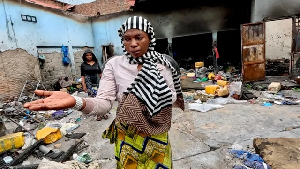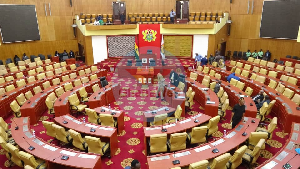Tongo(UER), Dec. 21, GNA - Upper East Region is the first to have an entire Baby-Friendly Hospital Initiative (BFHI) in the country, according to the World Health Organization (WHO). Dr John Koku Awoonor-Williams, Upper East Regional Director of Health Services, announced this at the launching and designation of Baby Friendly Facilities at Tongo in Talensi-Nabdam District at the weekend. Twenty-nine health facilities in the nine districts in the Region have been declared Baby-Friendly.
They are Gambibgo Health Centre, Sumbrungu Health Centre, Plaza/Coronation Clinic and Sherigu Health Centre in Bolgatanga Municipality, Yua Community Health Centre, Kayoro CHPS Centre, Kologo Community Health Centre, Naaga Health Centre, Biu Clinic and Kessena-Nankana Central Health Centre in Kassena-Nankana District. The rest are Sirigu Clinic, Chiana Health Centre, Nakole Clinic, Paga Health Centre and Kurugu Community Health Centre in Kessena-Nankana West District.
Others are Mognori Health Centre, Widana Health Centre, Pusiga Health Centre and Biduri Health Centre, Bawku East District, Yelwoko Health Centre, Googoo Health Centre and Tiili Health Centre in Bawku West District.
The rest are Garu Health Centre and Woriyanga Health Centre in Garu-Tempane District, Tongo Health Centre, Pwalugu Health Centre, Namoligo Health Centre, Pelungu Health Centre and Datuko Health Centre in Talensi-Nabdam District. Others are Fumbisi Health Centre, Chuchuliga Health Centre, Wiaga Public Health Centre, Kanjarga Health Centre, Sandema Hospital, and Siniensi Health Centre in Builsa District. The rest are Bongo-Soe Health Centre, Namoo Health Centre, Vea Health Centre, Zorko Health Centre and Bongo Hospital in Bongo District.
Dr Awoonor-Williams explained that success of the initiative alongside complementary interventions such as routine and mass immunization campaigns, Integrated Management of Childhood Illness (IMCI), Supplementary Feeding and Nutrition Rehabilitation Services, Malaria-Nutrition Initiative and the recent launch of Kangaroo Mother Care for improved neo-natal care, were the Region's Health Directorate Child Survival Indicators.
He said a national health survey results in 2007 revealed that the Region had best performance in most of the health indicators, "This means that our children are well protected from the childhood killer diseases and related preventable morbidity and mortalities". Dr Awoonor-Williams said the Region's exclusive breastfeeding by the end of 2007 was 93 per cent and noted that breastfeeding globally had been scientifically proven to be one of the best investments in human resource development.
He said it was also the most inexpensive and cost effective natural health intervention with high benefits for child survival, growth and development and noted that it was against the background of these benefits that Ghana Health Services attached more importance to breastfeeding as a key priority health interventions to improving healthy lifestyles, regenerative health and nutrition. Dr Awoonor-Williams said since the introduction of Baby Friendly Initiative in the Region to facilitate exclusive breastfeeding, it had been able through the Accelerated Child Survival and Development (ACSD) programme to institutionalise exclusive breastfeeding not only as a concept but more importantly, as a way of life among majority of the target population.
He said 687 mother support groups had been formed and trained on the policy, out of which 163 were actively linking up with health facilities to ensure that the best breastfeeding practices continued in the homes of lactating mothers in their respective communities. Dr Awoonor-Williams said sustainable public education campaigns through breastfeeding week celebrations, service delivery points both static and outreach, home visits, domiciliary deliveries and community durbars also continued to be launched to maximize the gains. He commended staff of GHS, Ghana Red Cross Society, UNICEF, World Food Programme, World Vision and Catholic Relief Service for their invaluable support.
Mrs Shaya Ibrahim Asindua, Head of UNICEF Office in Tamale, commended the Region for being the first in Ghana to have its entire health facilities being Baby-Friendly. She emphasised that one of four neonatal deaths could be avoided if mothers initiated breastfeeding in the first four hours of delivery. Mrs Asindua said breastfeeding was a practical intervention for achieving the Millennium Development Goal of reducing overall child mortality by two-thirds by 2015 and indicated that in 1993 only 15 per cent of mothers in Ghana initiated breastfeeding within an hour of birth but this had increased to 46 per cent in 2003. "This is a very welcoming achievement considering that 17 years ago exclusive breastfeeding was almost unheard of in Ghana. This is making a tremendous difference for children's health and survival, "Mrs Asindua said.
However, she said in Ghana about half of babies were delivered by skilled health personnel and initiated into breastfeeding while the other half was left out, and expressed the optimism that with the establishment of Baby Friendly facilities it would assist early initiation of breastfeeding in Ghana and ultimately reduce the country's infant mortality rate.
Mr Anaba Nabila, Talensi-Nabdam District Chief Executive said Government was more committed to the welfare of women and children and introduced the Free Maternal Health Delivery. He said Government through the District Assemblies had also provided health facilities and residential accommodation for health workers. Mr Nabila stressed the need for the sustenance of prudent programmes instituted by Government to improve the health sector, and appealed to Ghanaians to retain the ruling NPP Government in power to enable it continue with its good policies and programmes. 21 Dec. 08
Health News of Sunday, 21 December 2008
Source: GNA
Upper East Region first to acquire Baby Friendly Hospital facilities
Entertainment















